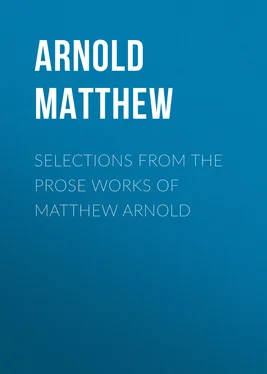Matthew Arnold - Selections from the Prose Works of Matthew Arnold
Здесь есть возможность читать онлайн «Matthew Arnold - Selections from the Prose Works of Matthew Arnold» — ознакомительный отрывок электронной книги совершенно бесплатно, а после прочтения отрывка купить полную версию. В некоторых случаях можно слушать аудио, скачать через торрент в формате fb2 и присутствует краткое содержание. Жанр: foreign_prose, literature_19, foreign_antique, на английском языке. Описание произведения, (предисловие) а так же отзывы посетителей доступны на портале библиотеки ЛибКат.
- Название:Selections from the Prose Works of Matthew Arnold
- Автор:
- Жанр:
- Год:неизвестен
- ISBN:нет данных
- Рейтинг книги:5 / 5. Голосов: 1
-
Избранное:Добавить в избранное
- Отзывы:
-
Ваша оценка:
- 100
- 1
- 2
- 3
- 4
- 5
Selections from the Prose Works of Matthew Arnold: краткое содержание, описание и аннотация
Предлагаем к чтению аннотацию, описание, краткое содержание или предисловие (зависит от того, что написал сам автор книги «Selections from the Prose Works of Matthew Arnold»). Если вы не нашли необходимую информацию о книге — напишите в комментариях, мы постараемся отыскать её.
Selections from the Prose Works of Matthew Arnold — читать онлайн ознакомительный отрывок
Ниже представлен текст книги, разбитый по страницам. Система сохранения места последней прочитанной страницы, позволяет с удобством читать онлайн бесплатно книгу «Selections from the Prose Works of Matthew Arnold», без необходимости каждый раз заново искать на чём Вы остановились. Поставьте закладку, и сможете в любой момент перейти на страницу, на которой закончили чтение.
Интервал:
Закладка:
But for all kinds of poetry alike there was one point on which they were rigidly exacting; the adaptability of the subject to the kind of poetry selected, and the careful construction of the poem.
How different a way of thinking from this is ours! We can hardly at the present day understand what Menander 14 14 . ~Menander~. See Contribution of the Celts, Selections , Note 3, p. 177.[Transcriber's note: this is Footnote 255 in this e-text.]
meant, when he told a man who enquired as to the progress of his comedy that he had finished it, not having yet written a single line, because he had constructed the action of it in his mind. A modern critic would have assured him that the merit of his piece depended on the brilliant things which arose under his pen as he went along. We have poems which seem to exist merely for the sake of single lines and passages; not for the sake of producing any total-impression. We have critics who seem to direct their attention merely to detached expressions, to the language about the action, not to the action itself. I verily think that the majority of them do not in their hearts believe that there is such a thing as a total-impression to be derived from a poem at all, or to be demanded from a poet; they think the term a commonplace of metaphysical criticism. They will permit the poet to select any action he pleases, and to suffer that action to go as it will, provided he gratifies them with occasional bursts of fine writing, and with a shower of isolated thoughts and images. That is, they permit him to leave their poetical sense ungratified, provided that he gratifies their rhetorical sense and their curiosity. Of his neglecting to gratify these, there is little danger; he needs rather to be warned against the danger of attempting to gratify these alone; he needs rather to be perpetually reminded to prefer his action to everything else; so to treat this, as to permit its inherent excellences to develop themselves, without interruption from the intrusion of his personal peculiarities: most fortunate when he most entirely succeeds in effacing himself, and in enabling a noble action to subsist as it did in nature.
But the modern critic not only permits a false practice: he absolutely prescribes false aims. "A true allegory of the state of one's own mind in a representative history," the poet is told, "is perhaps the highest thing that one can attempt in the way of poetry." And accordingly he attempts it. An allegory of the state of one's own mind, the highest problem of an art which imitates actions! No assuredly, it is not, it never can be so: no great poetical work has ever been produced with such an aim. Faust itself, in which something of the kind is attempted, wonderful passages as it contains, and in spite of the unsurpassed beauty of the scenes which relate to Margaret, Faust itself, judged as a whole, and judged strictly as a poetical work, is defective: its illustrious author, the greatest poet of modern times, the greatest critic of all times, would have been the first to acknowledge it; he only defended his work, indeed, by asserting it to be "something incommensurable."
The confusion of the present times is great, the multitude of voices counselling different things bewildering, the number of existing works capable of attracting a young writer's attention and of becoming his models, immense: what he wants is a hand to guide him through the confusion, a voice to prescribe to him the aim which he should keep in view, and to explain to him that the value of the literary works which offer themselves to his attention is relative to their power of helping him forward on his road towards this aim. Such a guide the English writer at the present day will nowhere find. Failing this, all that can be looked for, all indeed that can be desired, is, that his attention should be fixed on excellent models; that he may reproduce, at any rate, something of their excellence, by penetrating himself with their works and by catching their spirit, if he cannot be taught to produce what is excellent independently.
Foremost among these models for the English writer stands Shakespeare: a name the greatest perhaps of all poetical names; a name never to be mentioned without reverence. I will venture, however, to express a doubt whether the influence of his works, excellent and fruitful for the readers of poetry, for the great majority, has been an unmixed advantage to the writers of it. Shakespeare indeed chose excellent subjects—the world could afford no better than Macbeth , or Romeo and Juliet , or Othello : he had no theory respecting the necessity of choosing subjects of present import, or the paramount interest attaching to allegories of the state of one's own mind; like all great poets, he knew well what constituted a poetical action; like them, wherever he found such an action, he took it; like them, too, he found his best in past times. But to these general characteristics of all great poets he added a special one of his own; a gift, namely, of happy, abundant, and ingenious expression, eminent and unrivalled: so eminent as irresistibly to strike the attention first in him and even to throw into comparative shade his other excellences as a poet. Here has been the mischief. These other excellences were his fundamental excellences, as a poet ; what distinguishes the artist from the mere amateur, says Goethe, is Architectonicè in the highest sense; that power of execution which creates, forms, and constitutes: not the profoundness of single thoughts, not the richness of imagery, not the abundance of illustration. But these attractive accessories of a poetical work being more easily seized than the spirit of the whole, and these accessories being possessed by Shakespeare in an unequalled degree, a young writer having recourse to Shakespeare as his model runs great risk of being vanquished and absorbed by them, and, in consequence, of reproducing, according to the measure of his power, these, and these alone. Of this prepondering quality of Shakespeare's genius, accordingly, almost the whole of modern English poetry has, it appears to me, felt the influence. To the exclusive attention on the part of his imitators to this, it is in a great degree owing that of the majority of modern poetical works the details alone are valuable, the composition worthless. In reading them one is perpetually reminded of that terrible sentence on a modern French poet,— il dit tout ce qu'il veut, mais malheureusement il n'a rien a dire. 15 15 ~rien à dire~. He says all that he wishes to, but unfortunately he has nothing to say.
Let me give an instance of what I mean. I will take it from the works of the very chief among those who seem to have been formed in the school of Shakespeare; of one whose exquisite genius and pathetic death render him forever interesting. I will take the poem of Isabella, or the Pot of Basil , by Keats. I choose this rather than the Endymion , because the latter work (which a modern critic has classed with the Faery Queen!), although undoubtedly there blows through it the breath of genius, is yet as a whole so utterly incoherent, as not strictly to merit the name of a poem at all. The poem of Isabella , then, is a perfect treasure-house of graceful and felicitous words and images: almost in every stanza there occurs one of those vivid and picturesque turns of expression, by which the object is made to flash upon the eye of the mind, and which thrill the reader with a sudden delight. This one short poem contains, perhaps, a greater number of happy single expressions which one could quote than all the extant tragedies of Sophocles. But the action, the story? The action in itself is an excellent one; but so feebly is it conceived by the poet, so loosely constructed, that the effect produced by it, in and for itself, is absolutely null. Let the reader, after he has finished the poem of Keats, turn to the same story in the Decameron : 16 16 Boccaccio's Decameron , 4th day, 5th novel.
he will then feel how pregnant and interesting the same action has become in the hands of a great artist, who above all things delineates his object; who subordinates expression to that which it is designed to express.
Интервал:
Закладка:
Похожие книги на «Selections from the Prose Works of Matthew Arnold»
Представляем Вашему вниманию похожие книги на «Selections from the Prose Works of Matthew Arnold» списком для выбора. Мы отобрали схожую по названию и смыслу литературу в надежде предоставить читателям больше вариантов отыскать новые, интересные, ещё непрочитанные произведения.
Обсуждение, отзывы о книге «Selections from the Prose Works of Matthew Arnold» и просто собственные мнения читателей. Оставьте ваши комментарии, напишите, что Вы думаете о произведении, его смысле или главных героях. Укажите что конкретно понравилось, а что нет, и почему Вы так считаете.












